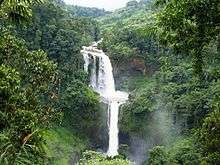Limunsudan Falls
| Limunsudan Falls | |
|---|---|
 | |
| Location | Sitio Limunsudan, Brgy. Rogongon, Iligan City, Philippines |
| Type | Plunge |
Limunsudan Falls is a two-tiered waterfall located in Sitio Limunsudan Brgy. Rogongon,[1] Iligan City, in the province of Lanao del Norte, Philippines, 55 kilometers away from the City proper. It is said to be the Philippines' highest waterfall with the height of 870 feet, with the lower part cascading alone higher than the Maria Cristina Falls.
The Limunsudan Falls lies along Bayog river at Sitio Limunsudan of Barangay Bayog in Tagoloan II, Lanao del Sur. Bounded on the east by Barangay Dagonalan; on the south by Barangay Bago-ah Ingud; on the west by Sitio Tamboacar (exclusively abode of the heirs of Alamada "or Amad" Dima); southwest by Sitio Lumbac-ah Ingud, and south by Angadun (Dar Al-Raaha), all of Barangay Bayog this municipality. Alamada "or Amad" Dima whose grave is in Ago-oh, Basak, Barangay Bayog, is a passed Sultan of Ragayan in Unayan (in maranao term, milupus sa Ragayan, Unayan) represented by his son late Pungguina-guina Minoy Talin Alamada (Pung-guina-guina ko Ragayan ko Unayan), a former member of the Guerrilla Forces by USAFE, and a former Teniente del barrio of Barangay Bayog and later appointed Teniente del barrio of Barangay Dagum-baan, Talakag, Bukidnon sometimes in the year 1960.
Barangay Bayog (Limunsudan is also a Sitio) of the Municipality of Tagoloan II, Province of Lanao del Sur, is derived, originated or named after the river named "Bayog". Bayog river (where Limunsudan Falls lies), from the mountainous terrain between east of Barangay Rogero of Municipality of Bubong and Barangay Marawi (Little Marawi) of Municipality of Tagoloan II, all of Province of lanao del Sur, is differ from Mandulog river. Madulog river and the Kapai river are, tributaries of Bayog river whose intersections are in Barangay Digkila-an[2] east of Upper Hinaplanon, all of Iligan City. Then, the river from this intersection to the sea shoreline, at the beach newly named as, "Bayog Island Beach", Iligan Bay, is called Hinaplanon river (traditionally called by the native inhabitant moros in this area as, "Mandulog river").
Bayog is a place having of wide or huge territorial jurisdiction under the Sultanate of Bayog (Sultan sa Bayog). Sitio Tambac (Central Area of Bayog) is the site and place in which the enthronement or crowning ceremony of the Sultan of Bayog will be held. Sultanate of Bayog is one of the "Four (4) Great Royal House of Tagoloan". The Four (4) Great Royal House of Tagoloan is the authority and has the executive power to appoint and crown (by majority) the qualified and selected Sultan of Tagoloan. Late Sultan Olowa Kalasan was the first Sultan of Bayog while Late Sultan Macatanong Kalasan (son of Late Sultan Olowa Kalasan) was the second Sultan (of Bayog). Datu Ali Iskander "Alexander" Kalasan (son of Late Sultan Macatanong Kalasan) is the successor and the third Sultan of Bayog.
In the past centuries (more than 500 years) ago, as per the covenant (in the pre-Spanish era after the arrival of the two brother, namely; Sarip Alawi and Sarip Kabunsuan), made between by the local chieftains (Sultans/Datus) and others from the adjoining places or sitios, the exclusive area or boundaries of Bayog, as follows; bounded on the northeast by Mount Lamin (upper Sitio Pangantapan); on the east by Bitaog river, Dagonalan and Kibulag; on the southeast by Ulamon river; on the south by Golingan river and Mount Alibudun and Kiyaliwas ; on the southwest by mountains (i.e.: Magantor, Kiadangkigan, and Sagada Peak); on the west by Karamatay river; on the northwest by Gabunan Mountain; on the north by Mount Gayakay, containing an approximate area of more or less 8,500 hectare.
This place (Bayog) where the first primary school was built in Sitio Pagalungan (after the Christian Bethany School in Talakag, Bukidnon), was predominantly inhabited by the six (6) clan, the children of Datu Maricor, a native moro belonged to Maranao tribe. The six clan (children of Maricor), namely; Bualan, Kalasan, Talin, Sirig, Duruan, and Ula, dwell in this place since time immemorial. However, in the year 1980s, mostly of the families moved and settled to the neighboring towns or cities for different causes, i.e. to avoid family feud, socio-economic and political problems, and other purposes, like; education, while some other families are still remain up to the present.
As of today, the natural appearance of Limunsudan falls differ from its form in the previous decades ago. The current and flow of the water is gradually reducing because its environment has been disturbed and then destructed due to the entranced and operation of the previous logging concessionaires in the area since in the year 1950s and some other local loggers operating illegally in this municipality.
At present, some areas that surround the Limunsudan Falls are occupied by the natives emigrated from Kalamlamahan of Barangay Rogongon of Iligan City since in the year 1995 together with other natives of hegaonon tribes from the nearby barangays or sitios.
References
Coordinates: 8°16′05″N 124°28′54″E / 8.268056°N 124.481667°E